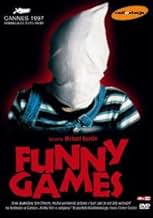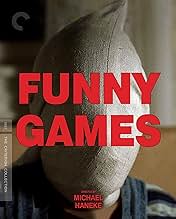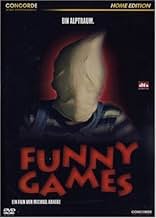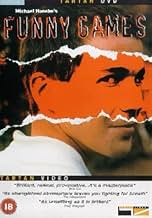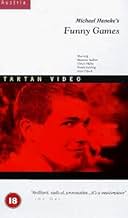Dois jovens violentos levam uma mãe, pai e filho como reféns em sua cabana de férias e os obrigam a jogar "jogos" sádicos para sua própria diversão.Dois jovens violentos levam uma mãe, pai e filho como reféns em sua cabana de férias e os obrigam a jogar "jogos" sádicos para sua própria diversão.Dois jovens violentos levam uma mãe, pai e filho como reféns em sua cabana de férias e os obrigam a jogar "jogos" sádicos para sua própria diversão.
- Prêmios
- 5 vitórias e 9 indicações no total
Avaliações em destaque
In this cross between Who's Afraid Of Virginia Woolf and A Clockwork Orange, two insolent young psychopaths torment a vacationing family.
It was hard to organize my thoughts on this movie, never mind rating it. As a thriller, this is a tense, well-acted, and relentless experience, marred only by a contrived sequence two-thirds through in which characters behave in unbelievably stupid fashion. However, said sequence is preceded by an incredibly effective ten-minute take. Unusually lengthy takes are often deemed self-indulgent, but this one is anything but.
As an ideological statement, though, this film is a failure. And there is no doubt that writer-director Michael Haneke is trying to make a statement. By having one of the psychos address the camera a few times, saying things to the effect that they have to give the viewers their money's worth, Haneke is essentially wagging his finger at anyone who has ever enjoyed the portrayal of violence in a film. This theme is certainly open to debate, but the problem is that Haneke expresses it in such a condescending way. His harrowing treatment of violence already serves as an excellent counterpoint to other films that glamorize it. There was no need to then leave viewers feeling as though they'd just been lectured by a stern parent.
The last time a filmmaker made me angry, it was when I saw Independence Day, and it was for the same reason. In both cases, the writer and the director display contempt by assuming their audiences are idiots. My anger didn't really ignite, though, until I watched a short interview with Haneke on the DVD. It made me never want to see another one of his films. The man is disgustingly full of himself.
So why the relatively high rating? Because as pretentious and self-important as Haneke is, he is also very talented. The movie is very effective on an emotional level, and it's possible to watch it while ignoring the director's wrong-headed decisions.
It was hard to organize my thoughts on this movie, never mind rating it. As a thriller, this is a tense, well-acted, and relentless experience, marred only by a contrived sequence two-thirds through in which characters behave in unbelievably stupid fashion. However, said sequence is preceded by an incredibly effective ten-minute take. Unusually lengthy takes are often deemed self-indulgent, but this one is anything but.
As an ideological statement, though, this film is a failure. And there is no doubt that writer-director Michael Haneke is trying to make a statement. By having one of the psychos address the camera a few times, saying things to the effect that they have to give the viewers their money's worth, Haneke is essentially wagging his finger at anyone who has ever enjoyed the portrayal of violence in a film. This theme is certainly open to debate, but the problem is that Haneke expresses it in such a condescending way. His harrowing treatment of violence already serves as an excellent counterpoint to other films that glamorize it. There was no need to then leave viewers feeling as though they'd just been lectured by a stern parent.
The last time a filmmaker made me angry, it was when I saw Independence Day, and it was for the same reason. In both cases, the writer and the director display contempt by assuming their audiences are idiots. My anger didn't really ignite, though, until I watched a short interview with Haneke on the DVD. It made me never want to see another one of his films. The man is disgustingly full of himself.
So why the relatively high rating? Because as pretentious and self-important as Haneke is, he is also very talented. The movie is very effective on an emotional level, and it's possible to watch it while ignoring the director's wrong-headed decisions.
I saw this movie again last night, for the third time, and once again had to keep watching each torturous minute until its chilling end. Going through the comments index, I see the expected responses: it was boring: it was pointless: it was too long: it's a satire: the games aren't actually that funny: it involved the audience in a neato way: it's nothing new: it's been done before. So I here offer an interpretation to add to the cacophany of reactions that FUNNY GAMES seem to engender.
What this movie reminds me of is the Book of Job, in the Bible, where God and Satan decide for their own amusement to torture this guy Job, killing his family, racking him with boils, and various other divine amusements. While watching this movie last night, I thought of another reference, this time from "King Lear": "Like flies to wanton schoolboys are we to the gods;/ They kill us for their sport." What this movie does is challenge the audience's own involvement in visual narrative -- usually, we watch movies from somewhere on-high and omniscient; we're invisible but we see all; we're voyeurs, just like God. In Haneke's film, we identify not with the victims but with the all-powerful killers as they set about their funny games. The two polite young men are performing their entertainments for us, the viewers; they're slaking our bloodthirst, our desire for gory spectacle - - after all, isn't this why we watch movies like this in the first place? Haneke, however, doesn't play the usual evasions; he makes explicit the audience's participation in violence; and he forces upon us the need to take responsibility for it.
I find this fascinating. I also find the negative comments here fascinating as well -- "not violent enough!" "the victims deserve to die..." "all the violence is off-screen..." "no gore at all, 'LAST HOUSE ON THE LEFT' did it first, with more blood...." etc. as being inadvertantly revealing of those viewers' psyche. I especially love the comment made by that one Viking guy, who writes that Haneke's film has "no point," and goes on to say "...I just hope those people break into MY house, so I can break them in two!"
I think Haneke made his point.
What this movie reminds me of is the Book of Job, in the Bible, where God and Satan decide for their own amusement to torture this guy Job, killing his family, racking him with boils, and various other divine amusements. While watching this movie last night, I thought of another reference, this time from "King Lear": "Like flies to wanton schoolboys are we to the gods;/ They kill us for their sport." What this movie does is challenge the audience's own involvement in visual narrative -- usually, we watch movies from somewhere on-high and omniscient; we're invisible but we see all; we're voyeurs, just like God. In Haneke's film, we identify not with the victims but with the all-powerful killers as they set about their funny games. The two polite young men are performing their entertainments for us, the viewers; they're slaking our bloodthirst, our desire for gory spectacle - - after all, isn't this why we watch movies like this in the first place? Haneke, however, doesn't play the usual evasions; he makes explicit the audience's participation in violence; and he forces upon us the need to take responsibility for it.
I find this fascinating. I also find the negative comments here fascinating as well -- "not violent enough!" "the victims deserve to die..." "all the violence is off-screen..." "no gore at all, 'LAST HOUSE ON THE LEFT' did it first, with more blood...." etc. as being inadvertantly revealing of those viewers' psyche. I especially love the comment made by that one Viking guy, who writes that Haneke's film has "no point," and goes on to say "...I just hope those people break into MY house, so I can break them in two!"
I think Haneke made his point.
I watched this year's remake of "Funny Games" prior to the original, simply because its sick-with-irony trailer got me extremely curious. Granted, this goes against my usual process of viewing a remake's precursor prior to the remake itself, but I couldn't help myself. By the end, I was astonished by writer-director Michael Haneke's audacity in telling a macabre home-invasion story devoid of Hollywood glamour, humor, and mercyremake or no, it's still one of the ballsiest exercises in visceral, reality-based horror ever released by a major studio.
So, when I decided to give the original "Funny Games" a spin (mere days after my viewing of American version), I was filled with presupposition toward how much I would appreciate the original (with the twists of Haneke's shot-for-shot remake still mapped out in my mind)similar to a sadistic "bet" our captors make with their prey, I was wondering if this earlier, German-language version would survive on its own terms. And, while each version is practically identical (save for some subtle nuances in the performances, the slightly varied location design, andof coursethe spoken language), both quite miraculously carry the same visceral, jaw-dropping sucker-punches as the other. Unlike the much-derided American remakes of "The Vanishing" and "Les Diaboliques," Haneke sees no need to let either culture off the hook, especially when each has its own prominent history of violence, on- and off-camera.
Ironically, the references to metalhead couch potatoes Beavis and Butt-Head probably seemed like an incendiary bitch-slap to the passive glamorization of American filmed violence in the 1997 version, but there is an even stronger sense of irony when the MTV-hosted duo are referenced in the remakeon the shores that birthed them, and the cult following of Generation Y-ers that has accumulated in the years since the show's cancellation (a sure sign that our passivity, if anything, is more pronounced now). It's subtle observations like this that give both versions of "Funny Games" an added resonance.
If anything takes some getting used to in the 1997 film, it's the general unfamiliarity of the cast. After seeing a collection of familiar performers run through Haneke's horrifying 2008 experiment, the German cast begins with a studied approach to the performances that eventually loosens into hysteria and desperation that is just as convincing as their remake counterparts. It is truly stunning how Haneke mines the same static framing and intense performances to ends that are equally effective in both films (even knowing the outcome of a protracted long take following a pivotal off-screen event, I found the experience just as emotionally agonizing to witness).
While it may seem hypocritical to "side" with Haneke (at least in the context his film creates), especially when I patronize (and am prone to enjoying) films that frequently downplay the reality of human suffering, the effect in both versions of "Funny Games" is undeniably powerfulthese are difficult, ugly, and emotionally draining films crafted with undeniable (and remarkably subtle) purpose. If there's any catharsis to be had from them, it will be in the introspection and assessment of your own attitudes toward violence.
So, when I decided to give the original "Funny Games" a spin (mere days after my viewing of American version), I was filled with presupposition toward how much I would appreciate the original (with the twists of Haneke's shot-for-shot remake still mapped out in my mind)similar to a sadistic "bet" our captors make with their prey, I was wondering if this earlier, German-language version would survive on its own terms. And, while each version is practically identical (save for some subtle nuances in the performances, the slightly varied location design, andof coursethe spoken language), both quite miraculously carry the same visceral, jaw-dropping sucker-punches as the other. Unlike the much-derided American remakes of "The Vanishing" and "Les Diaboliques," Haneke sees no need to let either culture off the hook, especially when each has its own prominent history of violence, on- and off-camera.
Ironically, the references to metalhead couch potatoes Beavis and Butt-Head probably seemed like an incendiary bitch-slap to the passive glamorization of American filmed violence in the 1997 version, but there is an even stronger sense of irony when the MTV-hosted duo are referenced in the remakeon the shores that birthed them, and the cult following of Generation Y-ers that has accumulated in the years since the show's cancellation (a sure sign that our passivity, if anything, is more pronounced now). It's subtle observations like this that give both versions of "Funny Games" an added resonance.
If anything takes some getting used to in the 1997 film, it's the general unfamiliarity of the cast. After seeing a collection of familiar performers run through Haneke's horrifying 2008 experiment, the German cast begins with a studied approach to the performances that eventually loosens into hysteria and desperation that is just as convincing as their remake counterparts. It is truly stunning how Haneke mines the same static framing and intense performances to ends that are equally effective in both films (even knowing the outcome of a protracted long take following a pivotal off-screen event, I found the experience just as emotionally agonizing to witness).
While it may seem hypocritical to "side" with Haneke (at least in the context his film creates), especially when I patronize (and am prone to enjoying) films that frequently downplay the reality of human suffering, the effect in both versions of "Funny Games" is undeniably powerfulthese are difficult, ugly, and emotionally draining films crafted with undeniable (and remarkably subtle) purpose. If there's any catharsis to be had from them, it will be in the introspection and assessment of your own attitudes toward violence.
First things first, Michael Haneke HATES Quentin Tarantino's films. He hates the way violence and death are shown as being 'cool' - Cool gangsters executing their enemies whilst saying cool lines (And you will know, that my name is the Lord! etc,etc)with a cool song playing in the background. This is not how violence is in the real world, violence is a horrible fact of life, not a glamourous thing for youths to copy, and I think Haneke intended Funny Games to show it how it really is. I watched Funny Games without the slightest clue what the film was about, so I just had to sit back and take it as it comes. At first, I wasn't too impressed. I thought the scenes were too long and dragged out, yet at the same time, I felt a strange feeling of suspense. The incredibly long camera shots leave you that bored, that you think "Something bad is going to happen soon, I can tell...". The suspense also lasts right through the film 'til the very end. You don't want to watch it, but at the same time, you feel hypnotised by it.
I will not detail any events of the film, to save spoiling the atmosphere, but I will note one thing that people tend to be confused about:- "Why did the family let them into the house in the first place?" The two characters of Peter and Paul are let to walk all over the family because of one flaw in the bourgios psyche - 'The more polite a person is, the better a person they are.' This absurd way of thinking is played on by Peter and Paul and they obviously score, plus 'getting into the house without breaking in' is also one of their 'games'.For those who haven't seen the film, I definitely wouldn't recommend this for a night in with the parents/girlfriend, but I definitely would for people who want to see the difference between death and Tarantino-glam. Prepare for a highly suspenseful yet sickeningly violent, non-Hollywood, edge-of-the-seat piece of art. 8/10
I will not detail any events of the film, to save spoiling the atmosphere, but I will note one thing that people tend to be confused about:- "Why did the family let them into the house in the first place?" The two characters of Peter and Paul are let to walk all over the family because of one flaw in the bourgios psyche - 'The more polite a person is, the better a person they are.' This absurd way of thinking is played on by Peter and Paul and they obviously score, plus 'getting into the house without breaking in' is also one of their 'games'.For those who haven't seen the film, I definitely wouldn't recommend this for a night in with the parents/girlfriend, but I definitely would for people who want to see the difference between death and Tarantino-glam. Prepare for a highly suspenseful yet sickeningly violent, non-Hollywood, edge-of-the-seat piece of art. 8/10
I think this movie attempts something virtually impossible, and probably only a German filmmaker would be interested in this particular problem. Watching film is intrinsically exploitive. Often the cinematic exaggeration of entering personal space results in violence. What about this?
An intelligent exploration of this problem from the viewer's side is "Clockwork Orange." Therapy in that case is forced viewing of a movie, presumably the exploration from the filmmaker's side. This is that movie.
Because it is about itself, it enters into a conspiracy of awareness about itself with the viewer. The intruders wink at the audience. Just before the movie begins the phase where it starts to shape up as a movie, that intruder remarks on it not yet being a movie. At one point, the action is "rewound" to be replayed with a different outcome.
It is all very clear. But the challenge is not to remark on the problem, but to say something interesting or new or useful about it. That may be impossible, at least with normal narrative techniques, so this exercise is something of a waste.
The one interesting thing for me is the white gloves. Most commenters assume this is to avoid fingerprints, which goes against every motive we see. As it is the only noticeable costuming, one must conclude it is to denote the cartoonish element.
Ted's Evaluation -- 2 of 3: Has some interesting elements.
An intelligent exploration of this problem from the viewer's side is "Clockwork Orange." Therapy in that case is forced viewing of a movie, presumably the exploration from the filmmaker's side. This is that movie.
Because it is about itself, it enters into a conspiracy of awareness about itself with the viewer. The intruders wink at the audience. Just before the movie begins the phase where it starts to shape up as a movie, that intruder remarks on it not yet being a movie. At one point, the action is "rewound" to be replayed with a different outcome.
It is all very clear. But the challenge is not to remark on the problem, but to say something interesting or new or useful about it. That may be impossible, at least with normal narrative techniques, so this exercise is something of a waste.
The one interesting thing for me is the white gloves. Most commenters assume this is to avoid fingerprints, which goes against every motive we see. As it is the only noticeable costuming, one must conclude it is to denote the cartoonish element.
Ted's Evaluation -- 2 of 3: Has some interesting elements.
Você sabia?
- CuriosidadesUlrich Mühe and Susanne Lothar, who play the father and mother, were a couple in real life from this movie until Mühe's death in 2007.
- Erros de gravaçãoWhen Anna and Georg are driving in their car, the reflection of a microphone between the front seats can be seen on the window.
- Cenas durante ou pós-créditosThe front credits list "music by" several classical composers and John Zorn. Given the director's outspoken views on modern media, including the "composer" of the hardcore "thrash metal" songs alongside the likes of Handel and Mozart is part of his message.
- ConexõesFeatured in The Last Days of the Board (1999)
- Trilhas sonorasCara Salva
from 'Atalanta'
Music by George Frideric Handel (as G.F. Händel)
Sung by Beniamino Gigli
Published by EMI DA 1918
Principais escolhas
Faça login para avaliar e ver a lista de recomendações personalizadas
- How long is Funny Games?Fornecido pela Alexa
Detalhes
- Data de lançamento
- País de origem
- Central de atendimento oficial
- Idiomas
- Também conhecido como
- Juegos divertidos
- Locações de filme
- Empresas de produção
- Consulte mais créditos da empresa na IMDbPro
Bilheteria
- Faturamento bruto mundial
- US$ 2.014
- Tempo de duração
- 1 h 48 min(108 min)
- Cor
- Mixagem de som
- Proporção
- 1.85 : 1
Contribua para esta página
Sugerir uma alteração ou adicionar conteúdo ausente

